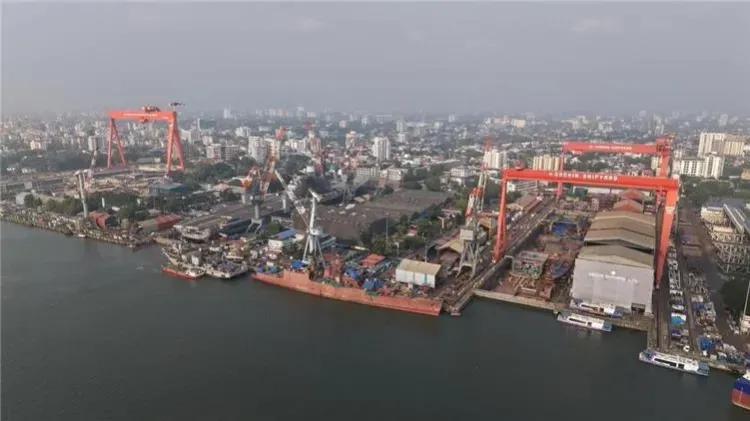How is India Strengthening Shipbuilding Ties with South Korea to Become a Global Leader by 2047?

Synopsis
Key Takeaways
- India aims to become a top five global shipbuilding nation by 2047.
- Collaboration with South Korea is key to leveraging advanced technology.
- India's current shipbuilding rank is 16th globally.
- Government investment of $8 billion is aimed at revitalizing the sector.
- 95% of India's trade currently relies on foreign vessels.
Seoul/New Delhi, Oct 6 (NationPress) India is aiming for enhanced collaboration with South Korea in the shipbuilding industry as it seeks to emerge as one of the top five shipbuilding nations globally by 2047, as stated by India's Secretary for Shipping. He emphasized the importance of merging Seoul's advanced technology with New Delhi's extensive workforce.
TK Ramachandran, Secretary of India's Ministry of Ports, Shipping and Waterways, expressed these insights during a recent press briefing with journalists from South Korea, Japan, and other countries in New Delhi. He indicated that India can become a vital partner for South Korea due to its workforce potential, according to reports from Yonhap news agency.
"Our primary challenge lies in acquiring technology and essential training modules from international partners," he mentioned. "Thus, we are collaborating with leading shipping nations like South Korea and Japan, which possess the skills but lack the workforce."
Ramachandran highlighted the extensive prospects for bilateral collaboration in the shipbuilding sector, noting that South Korea's shipyards are currently operating at full capacity.
"They face capacity constraints as many of their facilities are booked until 2028, limiting their ability to construct additional vessels. They are receiving orders but cannot fulfill them within Korea or Japan," he added.
With the vision of "Maritime Amrit Kaal Vision 2047," New Delhi aspires to elevate its current global ranking from 16th in shipbuilding to among the top ten by 2030 and ultimately to the top five by 2047.
On September 24, the Indian government approved a financial package of approximately 697 billion rupees (US$8 billion) aimed at revitalizing India's shipbuilding and maritime sector, expanding domestic shipbuilding capacity, as per the Indian ministry's website.
"Shipbuilding is a crucial strategic and commercial goal for us since we have historically held less than one percent of the global shipping tonnage," Ramachandran stated.
He noted that around 95 percent of India's imports and exports rely on foreign-flagged vessels, with only about 5 percent transported by indigenous ships.
"We are addressing this issue through international collaboration," he remarked.
In line with these initiatives, India is actively seeking partnerships with major shipbuilding nations, including South Korea and Japan, to bolster its domestic construction capabilities and establish new shipyards.
From late November to early December, an Indian delegation led by Ramachandran visited Hanwha Ocean's Geoje facility, Samsung Heavy Industries' shipyard, and HD Hyundai Heavy Industries' Ulsan shipyard in South Korea to identify potential collaboration opportunities.
South Korea currently stands among the world’s top three shipbuilders, alongside Japan and China, and hosts leading shipbuilding firms such as HD Hyundai Heavy Industries, Samsung Heavy Industries, and Hanwha Ocean.
Ramachandran indicated that India also aims to increase its fleet from the present 1,500 vessels to 2,500, and to expand its indigenous fleet from 5 percent to 7 percent by 2030, ultimately reaching around 70 percent by 2047.
He added that during global crises like the COVID pandemic and the Ukrainian conflict, freight rates surged from approximately US$2,000 to $15,000 per container, highlighting India's vulnerability to external influences.
"Owning, building, flagging, or registering—these three metrics are not only commercially viable but also strategically essential for India," he stated.
India's shipbuilding market is projected to grow significantly, increasing from its $90 million valuation in 2022 to $8.12 billion by 2033, according to London-based market tracker Finextra Research.
The maritime sector remains a vital pillar of India's economy, accounting for about 95 percent of the country's trade by volume and 70 percent by value, according to government data.









